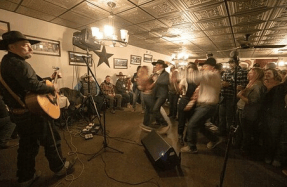
THE JOB WAS GUSTAVO’S IDEA, and the escape was his idea, too. “If he kills us, he kills us,” he told his kid brother, Iván, one night after work in October 2019. They had spent the day in the ranch’s corrals, selecting the best lambs for slaughter. Their boss, they said, carried a gun at all times.
“How are we going to get out of this?” Iván remembered thinking. He tried to come up with someone who could help them, then dismissed the idea. He and Gustavo were on their own.
Originally from Peru, the brothers had been recruited to work as sheepherders in the United States under a temporary work visa. For the past few years, they’d split their time between a ranch outside Cokeville, Wyoming — where they helped wrangle sheep for shearing and selected lambs for meat production — and the state’s remote deserts and mountains, where they grazed the sheep on the open range.
The hours were long and conditions were brutal, but they couldn’t see how to just leave. Their employers, Jon and Vickie Child, took his passport, Gustavo said, and the brothers had limited cellphone access; he said they also lacked access to a car, or even a map. If Child flew into a rage, “we were afraid he’d kill us, throw us somewhere, and no one would find us,” said Iván. “Our families would have no idea what happened.” (Iván and Gustavo asked to use pseudonyms, citing fear of retaliation.)
The next evening after sunset, Iván made sure that the sheep were secure in their corral, then he and Gustavo started walking along the shoulder of the county road. Cokeville is an old pioneer town, best known for a hostage crisis in the 1980s, and Gustavo and Iván wanted to get as far away from it as possible. They thought the next town over, Kemmerer, was just a 30- or 40-minute walk away; it’s actually closer to 15 hours.
“This was the only decision (we could make), and we accepted it,” said Iván. “If he catches us, he catches us.” Still, he said, “you get these ideas.” Maybe Child’s set up cameras, he thought. The highway was dark and getting colder. Maybe he already knows we’re gone.
They weren’t the only sheepherders who had tried to escape their employers. Another sheepherder, Simeón, caught a ride with a friend of a friend, while Gilmer ran to the highway and flagged down a car. Then he called the cops on his boss. “I was born to succeed, not to be humiliated,” he wrote in a statement to police. (Both men asked to use pseudonyms, fearing retaliation from their employers.) In Idaho, a sheepherder managed to get away from his employer’s ranch but froze to death as he was making his escape, according to a 2017 civil complaint filed by one of his co-workers. (The charges were dismissed after the case was settled out of court.) Herders have flagged down long-haul truckers and big-game hunters, sometimes sporting “horrendous injuries,” said Jenifer Rodriguez, the managing attorney for Colorado Legal Services’ migrant farmworker division, a nonprofit that represents these workers.
“In the United States, we live in enslavement or semi-enslavement,” said Jorge, who worked as a sheepherder in Colorado in 2008. (Jorge is not his real name.)
Sheepherders are a fixture in the West’s remote corners, working long, lonely hours on the open range. The nation’s small sheep industry relies on immigrant workers who enter the country under the federal H-2A program for seasonal guest workers; at any given time, there are anywhere from 1,500 to 2,500 H-2A herders in the U.S. While ranchers acknowledge the job can be difficult, many insist that abuse allegations are overblown.
But the industry is beset by a level of abuse that even seasoned farmworker attorneys, government officials and human-trafficking experts find extreme. “These are actually the most scared workers I’ve ever encountered,” said David Seligman, the executive director of the labor rights nonprofit Towards Justice, which has sued herding-industry trade groups on workers’ behalf.
For years, a group of Peruvian diplomats, U.S. government officials, public interest attorneys, labor advocates and




